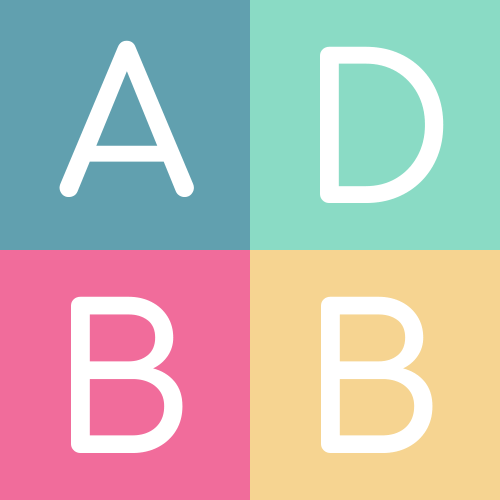Introductory level: Know how to screen with consensus quickly.
Webinar M-ADBB = 3h Initiation for teams in group, online.
Basic level: Finding your way around the scale, assessing the level and chronicity of relational withdrawal.
Basic training = 35-37h online or face to face + online
Expertise level: All of the above, research assessment and intervention assessment to inform decisions
Advanced training =65h online with clinical training and certification.
The face to face training takes place over 4 days: Two days in the first instance with the theoretical presentation and the first training session
A second one-day module three weeks to one month after the first module
A third one-day module three weeks to a month after the previous one
The training then requires an online follow-up of at least two half-days.
The pedagogical form of face-to-face training is less effective pedagogically because the trainees only see the learning and observation videos once, whereas in online training, you have the possibility of seeing the observation videos and the feedback from the class as many times as you want, which allows us to have 100% of people certified at the end of the training.
The digital training takes place over 12 weeks with 65 hours of work for the learners. It includes a clinical training based on your own clinical experience and a certification. It is organized around three pillars:
The digiforma platform where all the training content is stored and which gives you the possibility to be flexible. Each week, a specific content is unlocked.
A virtual class of two hours each week during which the learners exchange with the expert trainer about the observation videos they will have had access to during the week. This class is recorded and can be made up in case of absence.
A learner community where all the exchanges between learners take place (collective and group work), where questions can be asked to the trainers and where complementary theoretical and clinical contributions are brought according to your specific needs.
It is possible to organize a digital training plus course (30h) without the clinical training and without the certification.
For more information contact Jocelyne Guillon
We organize training for the M-ADBB only online and for groups. It is a three-hour theoretical and practical training that allows you to understand the concept of relational withdrawal, to use the M-ADBB scale to screen for babies who are likely to be in relational withdrawal. The training includes practice videos. The M-ADBB training does not replace the ADBB training. It is more of an introduction to the concept of relational withdrawal and a tool for front-line professionals. Any positive evaluation of the M-ADBB should be confirmed by an evaluation of the ADBB.
The M-ADBB training is accessible to ALL health, mental health, social and childcare professionals, whatever their initial level of qualification, who work in contact with families and babies. It will allow you to quickly detect babies at risk. The ADBB training is accessible to ALL health, mental health, social and childcare professionals, whatever their initial level of qualification, who work in contact with families and babies. It will enable you to master the skill of observation and the notion of relational withdrawal. You will be able to evaluate the baby in any observation situation and to verify the evolution of relational withdrawal according to the intervention or the adversities that the baby encounters.
The ADBB and the M-ADBB are used today :
In PMI (ONE consultation in Belgium) in the first line follow-up of babies’ health
In hospitals in neonatology and pediatrics
In hospitals in mother and baby units
In mother and child homes
In a residential nursery
In day care
In the accompaniment of the maternal assistants
In home visits for the follow-up of families
In CMP and other mental health centers
In pediatrics, psychology and child psychiatry, by midwives in private practice
In osteopathy, physiotherapy, psychomotricity in private practice or in institutions
In mother-baby workshops, baby massage organized by mental health professionals
Both the ADBB and the M-ADBB require at least ten minutes of observation time. Ideally in a structured and standardized situation that allows the examiner to put into perspective the reaction of the children to the
to the same stimuli.
The examiner should engage the child in the relationship by talking, touching, smiling, for example.
These conditions can be fully adapted to the clinical examination of infants in consultation. And it seems to be easily integrated into the health journal, we find in particular, on the pages concerning the examination of the 2 months and 4 months, the boxes: “smile answer”, “moves vigorously the limbs”, “follows with the eyes”, “emits a vocal response to a solicitation”, “vocalizes”, « grabs an object that is held out to him”. These parameters sought during the developmental examination are also to be taken into consideration in the M-ADBB evaluation.
However, an M-ADBB cannot be performed if the child comes in for an acute illness, it is also important to ensure that the child is not sleepy, hungry, in need of changing, or any other cause of discomfort that causes constant crying or screaming. In all these situations, the child may present a normal reactionary withdrawal from relationships.
The M-ADBB scale was developed to be more easily used in daily clinical practice. Unlike the ADBB scale, which often relies on video for scoring, this is absolutely video for scoring, this is absolutely optional for the M-ADBB.
This scale is suitable for use in developmental follow-up consultations, excluding acute pathology.
The authors recommend its use for all children aged 3 to 18 months, but in practice it is also used from birth to 24 months as the long version.
It is conceivable that the scale could be used systematically for universal screening purposes. Situations at risk of relational withdrawal (see: causes of withdrawal) should particularly attract attention.
